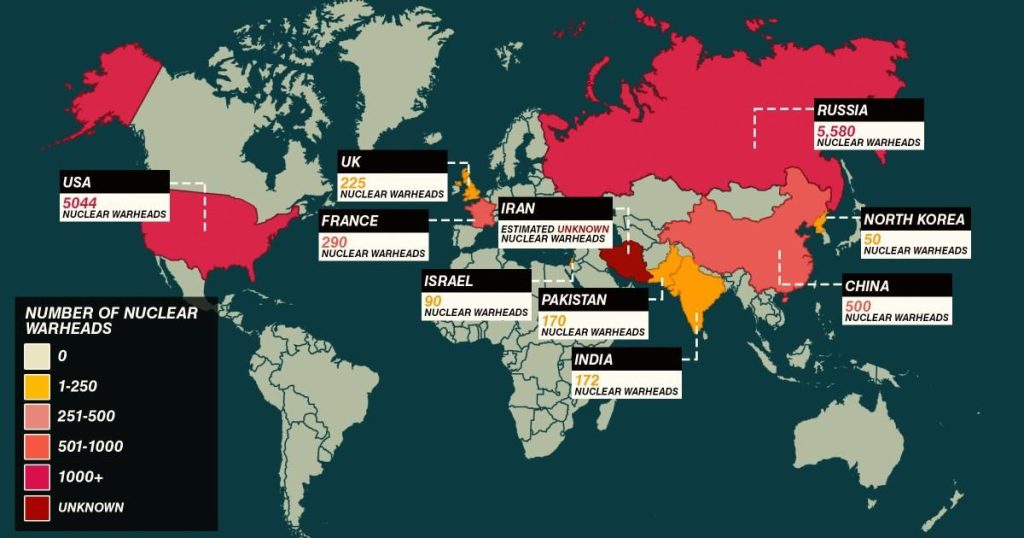Listen to the article
Global Nuclear Arsenal: Russia Leads with Over 4,300 Warheads, Not the US
Following Donald Trump’s recent claim that the United States possesses more nuclear weapons than any other country, a comprehensive fact-check reveals this assertion to be false. Trump made the statement on TruthSocial before meeting with Chinese leader Xi Jinping in South Korea, while announcing plans to resume nuclear testing for the first time in 33 years.
Contrary to the former president’s claim, Russia maintains the world’s largest nuclear arsenal with an estimated 4,309 warheads, significantly outpacing the United States’ stockpile of approximately 3,700 nuclear weapons. Together, these two superpowers control roughly 90% of global nuclear weapons.
According to data from the Federation of American Scientists, nine countries have formally declared possession of nuclear armaments, with several of them actively expanding their arsenals. China, India, North Korea, Pakistan, and the United Kingdom are all believed to be increasing their nuclear stockpiles.
Russia’s nuclear dominance stems from its long-standing strategic approach of maintaining nuclear superiority over the United States. Though Russia has retired approximately 1,150 warheads, its active arsenal remains the world’s largest. At the height of the Cold War, the United States possessed over 32,000 nuclear warheads in 1967, but has since dramatically reduced this number, with around 1,477 now retired.
China ranks third globally with approximately 600 nuclear warheads, though Pentagon assessments project this number will increase to 1,000 by 2030, reflecting Beijing’s growing military ambitions and strategic positioning in Asia and beyond.
France maintains the fourth-largest nuclear arsenal with 290 warheads. Despite being involved in few international disputes, France has maintained a substantial nuclear deterrent, though it has reduced its stockpile by approximately 50% since the end of the Cold War.
The United Kingdom rounds out the top five with an estimated 225 nuclear warheads. Britain’s nuclear deterrent is housed at HM Naval Base Clyde in western Scotland, with submarines based at Faslane serving as the primary deployment platform.
Pakistan and India, regional rivals with a history of conflict, possess similar nuclear capabilities with approximately 170 and 180 warheads respectively. Both countries developed nuclear weapons primarily as defensive measures against each other, with Pakistan initiating its nuclear program following its 1971 war with India.
Israel, while never formally acknowledging its nuclear program, is estimated to possess around 90 warheads. Analysts believe Israel can deliver nuclear weapons via air, submarine-launched cruise missiles, and the Jericho line of ballistic missiles with ranges from intermediate to intercontinental.
North Korea, the newest declared nuclear power, is believed to have approximately 50 warheads but possesses the material to potentially double this number if desired.
Iran presents a special case, maintaining a nuclear program while insisting it has not developed warheads. Since the US withdrawal from the nuclear non-proliferation treaty in 2018, Iran has accelerated production of fissile material. Experts now believe Tehran has accumulated enough enriched uranium to construct several nuclear bombs, though delivery capabilities remain limited.
The current global nuclear landscape reflects ongoing tensions and strategic calculations among major powers, with the total number of warheads worldwide remaining at concerning levels despite reductions since the Cold War peak.
Fact Checker
Verify the accuracy of this article using The Disinformation Commission analysis and real-time sources.




12 Comments
This fact check provides important context around Trump’s claims about the US nuclear arsenal. It’s critical that public discourse on such sensitive issues is grounded in verifiable data, not political posturing.
I agree. Factual accuracy is essential, especially when it comes to matters of national security and global stability. Relying on credible sources is key to having a meaningful dialogue on these topics.
It’s concerning to see reports of several nuclear-armed nations actively expanding their arsenals. With the ongoing tensions between major powers, this nuclear proliferation trend is worrying from a global security standpoint.
You’re right, the nuclear arms race appears to be accelerating again. This underscores the importance of renewed diplomatic efforts to promote nuclear nonproliferation and disarmament on an international scale.
Interesting to see the facts around global nuclear arsenals. While the US has a sizable stockpile, it’s clear Russia maintains the largest nuclear force worldwide. I wonder what factors have contributed to this imbalance in recent decades.
You raise a good point. The nuclear balance of power between the US and Russia has evolved over time, with Russia seeming to prioritize maintaining nuclear superiority as a strategic objective.
The data provided in this fact check serves as a sobering reminder of the immense destructive power still held by the world’s nuclear superpowers. Maintaining transparency and accountability around these weapons is critical.
Absolutely. Openness and verification are essential to building trust and reducing the risks of miscalculation or unintended escalation, especially between nuclear-armed states with complex geopolitical rivalries.
While the focus of this article is on nuclear arsenals, the larger context of global energy and resource competition is also an important consideration. Conflicts over access to strategic minerals and fuels can contribute to heightened tensions between nations.
That’s a good point. The geopolitics of energy and critical minerals are closely intertwined with nuclear dynamics and national security concerns. Addressing these complex interdependencies will be crucial for promoting global stability.
This fact check serves as a valuable reality check on political rhetoric around nuclear weapons. It’s important for the public to have access to authoritative, data-driven information on these critical issues.
Agreed. Fact-checking and holding leaders accountable for their claims is essential, especially on matters of national security that can have grave consequences. Maintaining an informed, fact-based public discourse is key.